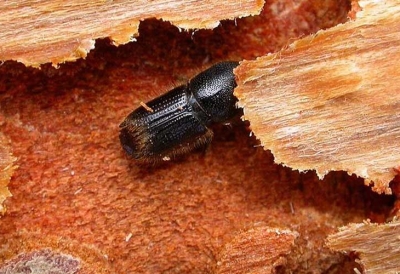If ips beetle “engravings” were found on a cave wall, they might be considered an early art form. Intricate patterns surround entire tree trunks under the bark. But these engravings could result in serious damage or even death to pine or spruce trees.
Ips beetles are a group of opportunistic bark beetles. They typically infest stressed trees – like recently transplanted trees or trees weakened by events like root injury, trunk or branch wounds, drought, flooding or poor soil conditions. Because they prefer weaker trees, ips beetles aren’t considered as aggressive or destructive as bark beetles, but because their handiwork can kill, infestations should be managed.
Colorado is host to eleven species of ips beetles that can be found throughout the state. Only 1/8” to 3/8” long, they are reddish-brown to black
Even though ips beetles prefer stressed trees in which to lay their eggs and spend most of their lives, freshly-chopped wood is a favored breeding ground. After mating, females create an area to deposit eggs (called an egg gallery) by excavating tree tissue. Larval beetles create tunnels off the main gallery, feeding off sapwood. Colorado climate is conducive to the ips beetle’s reproduction cycle and one female can produce two to four new generations in one year.
Yellow-brown boring dust is created by the boring female and the larvae and the dust, in addition to small, round holes in the bark are a sign of infestation. However, these signs are also indicative of bark beetles. Since specific species require specific treatment, precise identification is important. In the case of ips beetles, Mother Nature often helps. Woodpeckers are particularly fond of ips beetles and their frequent appearance on pines or spruce can indicate infestation.
Do you have an ips beetle infestation? Contact SprayTech, Colorado tree health care eperts, at 720-248-0000 for a tree inspection and treatment plan.
Comments are closed.